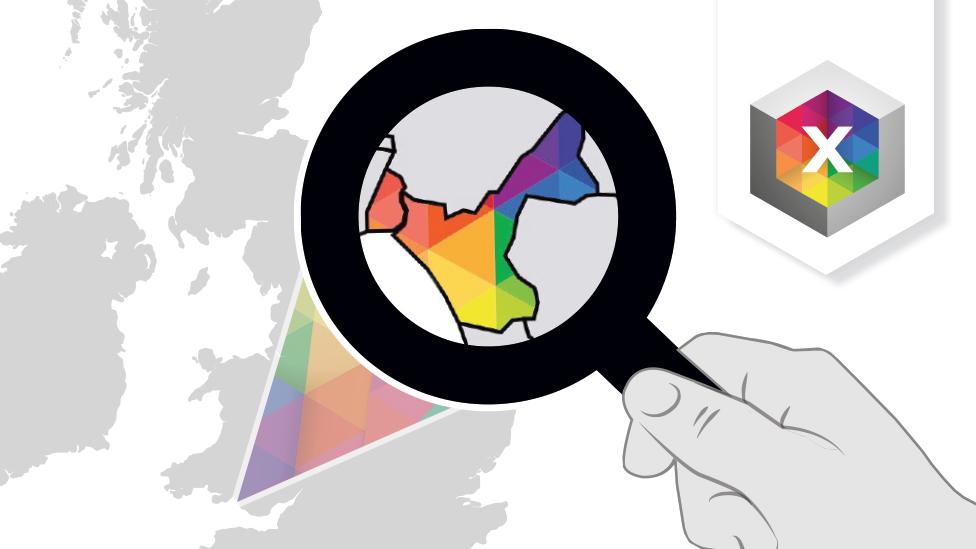General election 2019: Is the DUP affair over?
- Published
- comments
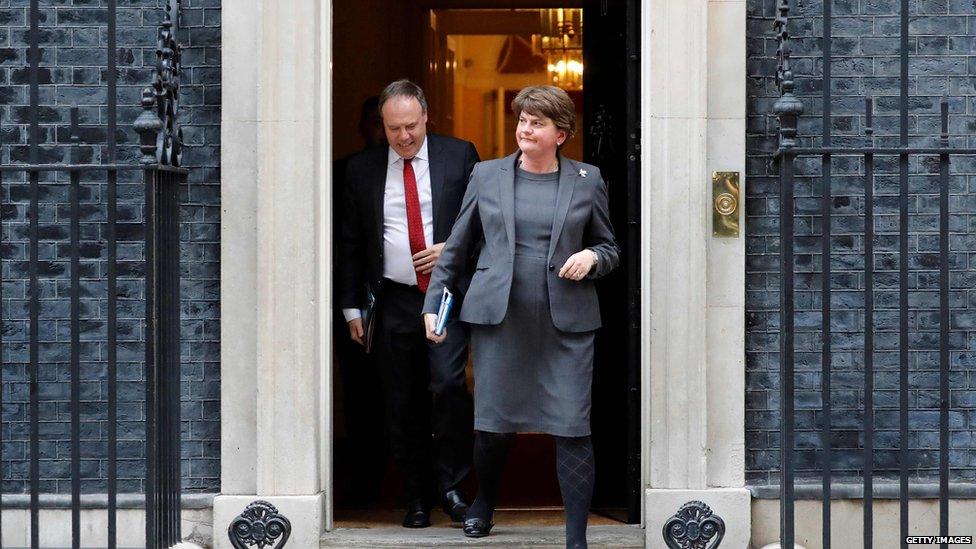
"Who are the DUP?" became one of the most asked questions on Google UK in 2017.
The DUP has featured prominently in decisions affecting all our lives since that 2017 election.
("How to make slime" beat the DUP to Google's top spot but I'll make no judgements about the nation's priorities here!)
The party is well-known in Northern Ireland for its brand of social conservatism but more widely there was considerable ignorance about the new allies of No 10.
Extra money
Over the past two years that has changed. The DUP leader, Arlene Foster, is now a familiar face in UK politics, she has wielded a veto over the government at key moments and has secured £1bn of extra cash for Northern Ireland.
In 2017, the DUP was effectively able to name its price. It had just enough seats, with 10 MPs, to tip the balance of power and offer the Conservatives a small majority, by means of a confidence and supply agreement, in return for the £1bn to spend at home.
So will this general election bring about a new money-spinning opportunity for Northern Ireland?
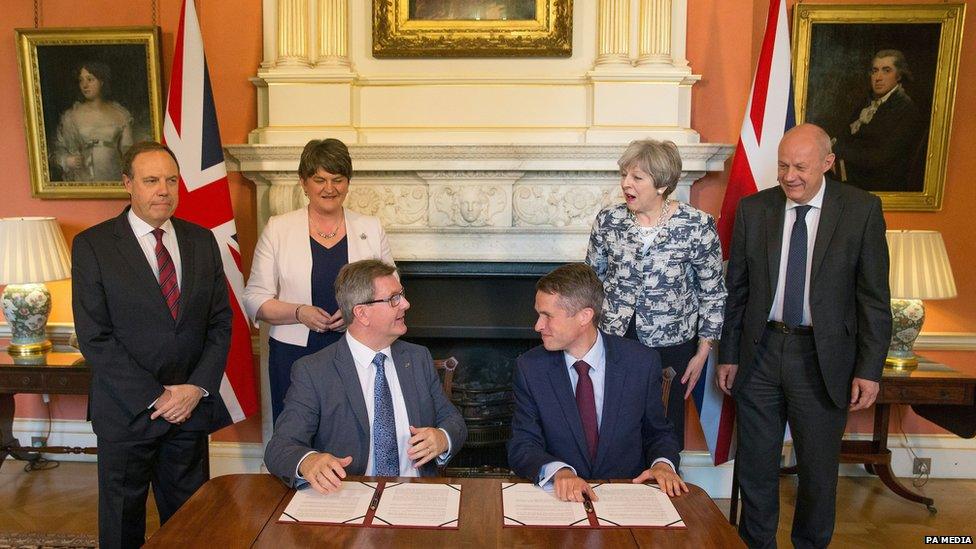
The DUP signed a confidence and supply agreement with Theresa May's Conservatives
At this election the DUP is "desperate for another mathematical miracle", according to professor of politics at Liverpool University Jon Tonge.
But for the Democratic Unionists to retain their status as kingmakers, he says, will require a scenario they would be freakishly lucky to repeat.
'Wishful thinking'
"A Boris Johnson minority administration may keep the DUP in place," says Prof Tonge, but only if the DUP again has the right number of seats to offer the Conservatives a majority.
"If the Conservatives win big then it's really over for the DUP. Why would you have the DUP onside if you don't need them?"
And he points out that "the DUP certainly aren't natural allies of Corbyn", making a DUP-Labour partnership unlikely.
"So it may be a position of power the DUP will never enjoy again."
The DUP chief whip, Sir Jeffrey Donaldson, has claimed the party will still have leverage over the Conservatives after polling day.
But this may be wishful thinking.
At a number of key moments the Tories may have regarded the DUP, frankly, as a pain in the neck, in terms of its capacity to scupper deals. And the confidence-and-supply agreement between the two parties has often been extremely strained.
Brexit dramas
Arlene Foster famously embarrassed Theresa May publicly during Brexit negotiations in December 2017, forcing her to pull out of an interim agreement in Brussels at the last minute, until the DUP was happy with the wording of the text.
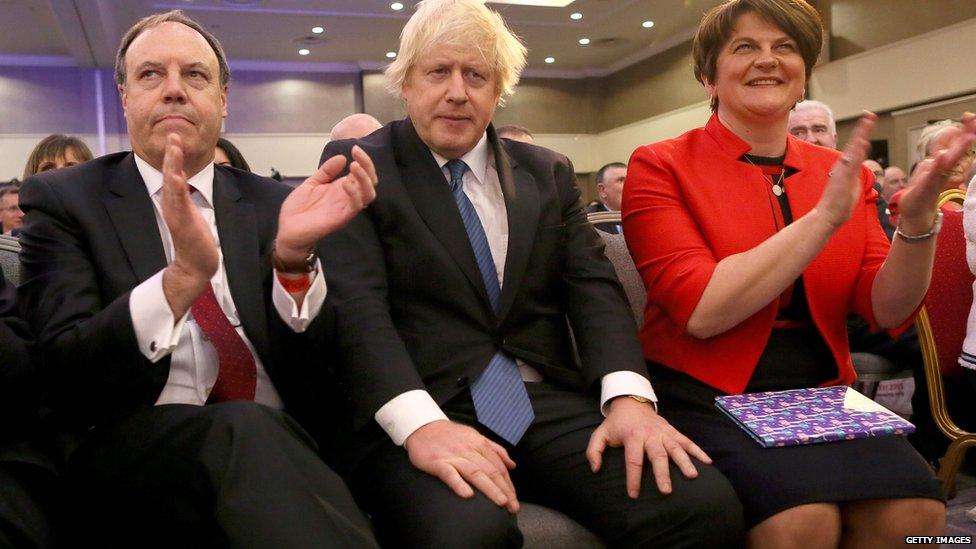
Boris Johnson attended the DUP conference in Belfast in November 2018
And the party's opposition to Theresa May's EU Withdrawal Deal was crucial.
The DUP backs Brexit, but remaining part of the Union of the UK is sacrosanct for the party.
This fundamental principle was seen to be undermined by Theresa May's agreement that Northern Ireland might have to diverge from the rest of the UK on rules for goods after leaving the EU.
But it was a concession the EU insisted was necessary to keep an open border between Northern Ireland and the Republic of Ireland.
Three times the DUP voted against Mrs May's deal when she tried and failed to get Parliament's approval.
"The Tories naively thought they could outsmart the DUP, when the DUP are some of the toughest negotiators around," says Prof Tonge.
"The party has often been prepared to walk away, and has said no a lot more times in its history than it's said yes."
If the 2019 general election marks the end of the DUP's days in the sun, it will be bitter-sweet.
Cast aside
The party has experienced a level of UK-wide recognition and influence about which it could once have only dreamed.
At its peak, Boris Johnson made a starring appearance at the 2018 DUP party conference. Rapturous applause greeted him as the party enthusiastically sided with Mr Johnson's vision for Brexit over Theresa May's.
But the honeymoon was not to last.

MANIFESTO NEWS: DUP 'will still seek changes' to Brexit deal
CONFUSED? Our simple election guide, external
POLICY GUIDE: Who should I vote for?, external
CONSTITUENCIES: Who's standing where you are?
NORTHERN IRELAND: All the parties and candidates

Proclamations Mr Johnson had made - declaring no PM should allow Northern Ireland to be treated differently (music to DUP ears) - appeared surrendered in his quest to secure a new Brexit agreement.
After forming an initially warm and cuddly relationship with Mr Johnson, the DUP was quickly cast aside.
In the wake of this betrayal, the party landed a fatal blow.
DUP votes made the difference in inflicting a humiliating parliamentary defeat on Boris Johnson over his Brexit timetable, forcing him to ask for another delay from Brussels which he had sworn not to do.
'Betrayal and bitterness'
Ultimately the DUP's leverage over the Brexit process came to an end once Boris Johnson decided to put his offer to the country via a general election.
Non-DUP voters have often bemoaned the impression wrongly created that the DUP, a pro-Brexit party, represents all of Northern Ireland. It does not - a majority in Northern Ireland voted to remain.
Sinn Fein's long-held abstentionist policy means its MPs do not take up their Westminster seats. So - aside from the lone pro-remain voice of independent unionist MP Lady Sylvia Hermon, who is not standing for re-election next month - Northern Ireland's anti-Brexit viewpoint has not been expressed as prominently in the Commons as it might have been.
The DUP will talk up its achievements as government allies, but will harbour hurt and regret.
"They'll always point to the confidence-and-supply agreement and all the money it got, but it all ended in tears," says Prof Tonge.
"It's like when a relationship breaks up, it's that sense of betrayal, that bitterness that is there because they've been betrayed by Boris Johnson.
That will take a long time to exhume.
- Published18 November 2019
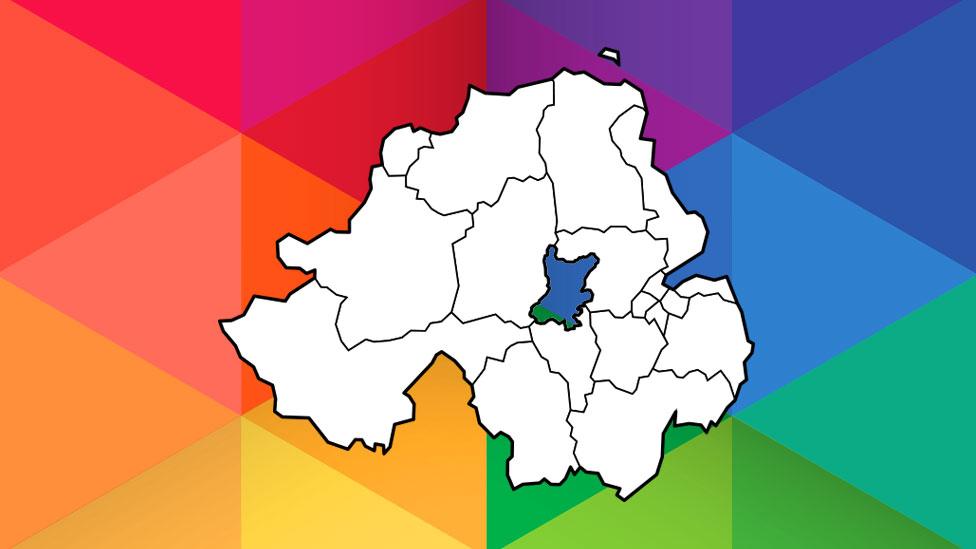
- Published18 November 2019
